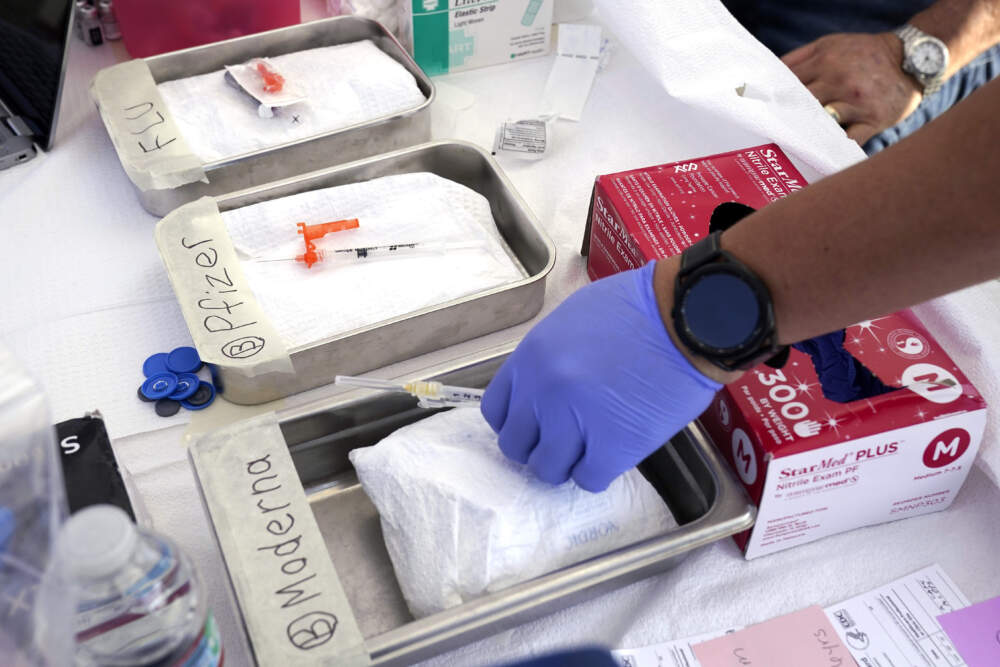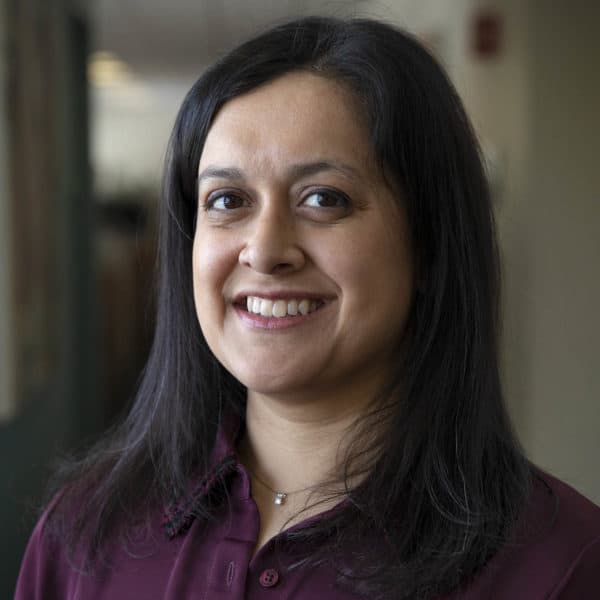Advertisement
Lagging COVID, flu and RSV vaccination rates concern Mass. health officials

Few people are rolling up their sleeves for the new COVID vaccine, even as peak respiratory virus season is looming.
The latest data from the Massachusetts Department of Public Health shows just 9% of residents have received the shot since the latest boosters started to roll out in mid-September.
A greater share, 21%, have received a flu vaccine, but that’s still tracking behind previous years, according to public health officials.
“We're not doing as well as we should be in flu vaccines compared to prior years,” Dr. Robbie Goldstein, commissioner of the Department of Public Health, told hospital leaders this week. “We are dramatically lower in our COVID vaccination rates than we have been in prior years. And RSV vaccination — a new vaccine — is really lagging where we had expected it to be.”
The RSV vaccine is available for people at high risk of illness from RSV, or respiratory syncytial virus, while the COVID and flu shots are recommended for almost all Americans 6 months and older, according to the Centers for Disease Control and Prevention.
“Each vaccine is really important and helps us protect ourselves, our communities and our health care [system],” Goldstein said.
The COVID vaccine was reformulated this fall to better match the current strains of the virus, similar to the way the flu vaccine is regularly updated. But supply delays made for a bumpy start to this COVID vaccination effort, causing delays for people eager to get the shots in the days immediately after they were approved.
There’s a lot more vaccine available now. CVS officials, for example, say they are "well positioned" to meet patient demand. But doctors acknowledge that interest in the vaccine may be waning as the public tires of COVID and tires of getting shots. People who previously had only mild cases of COVID may not feel the need to roll up their sleeves for another vaccine.
“There’s a sense of complacency,” said Dr. Philip Landrigan, director of the Program for Global Public Health and the Common Good at Boston College. “People are just not as uptight about COVID as they were.”
Landrigan said he’s hopeful more people will opt for shots in the coming days. Doctors generally recommend getting the COVID and flu vaccines by November.
“Around this time of the year, people realize that the days are getting shorter, the days are getting colder, we're all going to spend more time indoors in close quarters,” he said. “That often is the stimulus that persuades people it's time to go out and get the vaccine.”
Dr. Larry Madoff, medical director of the Bureau of Infectious Disease and Laboratory Sciences at the state's Department of Public Health, also urged people to get vaccinated, noting hybrid immunity — from prior infection and vaccinations — is the most protective.
“Even if you've had COVID, you should still get vaccinated,” he said. “It adds to your protection, makes it less likely that you'll get long COVID, makes it less likely that you'll have a severe infection.”
People recently infected can wait up to three months before getting a booster shot, according to the CDC.
State data shows a greater share of older people are getting vaccinated. Twenty-five percent of people age 65 to 79 had received COVID boosters by Oct. 21, compared with about 2% of children under 5.
There are also disparities by race and ethnicity. Almost 10% of white residents in Massachusetts have received COVID shots this fall, compared with less than 3% of Black or Hispanic residents.
Nationally, CDC officials said last week that about 7% of adults and 2% of children have received the new shots.
COVID levels were on the rise for much of the summer and early fall. COVID, flu and RSV are currently at low levels in Massachusetts, according to state health officials, but all three viruses are expected to flare up during the colder months.
Doctors and hospitals are hoping to avoid a “tripledemic,” in which all three respiratory viruses peak around the same time, straining the health care system.
Around this time last year, hospitals were struggling to treat an influx of young children severely ill from RSV. This year, there are two new options to protect babies from the virus. One is the vaccine, which pregnant women can take in the third trimester to provide immunity to infants in the first six months of life. The other is a preventive monoclonal antibody treatment that is administered to babies after birth.
The preventive drug, nirsevimab, is in short supply nationally, and CDC officials have asked doctors to prioritize the treatment for younger babies and those with heart or lung conditions that put them at higher risk.
“Nobody is pleased with the shortage,” said Dr. Rick Malley, senior infectious disease physician at Boston Children's Hospital. But he noted that medication shortages are common.
Malley said there is another, older preventive treatment available for babies who don’t have access to nirsevimab, though it requires monthly injections instead of a one-time shot. He also urged pregnant women to get the RSV vaccine, which in most cases is expected to provide enough protection for their babies to forgo nirsevimab.
“Many pediatricians and infectious disease doctors are very excited" about the new preventive treatment, Malley said. “We think it could really have a significant impact on the health of children. We hope that this shortage will be short-lived.”
